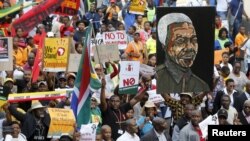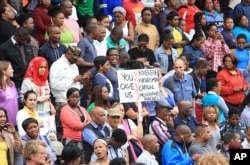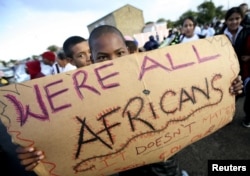Fake news and misinformation are fueling bloody xenophobic clashes in South Africa and elsewhere on the continent, according to a non-profit that promotes accuracy in African public debate and the media.
Amidst growing tension, Africa Check has been debunking false information in South Africa and beyond.
The television news program Carte Blanche recently made one such claim, that one-third of nearby Malawi’s population had immigrated to South Africa. The actual figure is much lower, and the program has since corrected the statement.
“Basically, it’s causing unnecessary tension, and people have misplaced ideas about migration,” said Anim van Wyk, editor of Johannesburg-based Africa Check. “I think people just don’t believe the official estimates. People also believe news like, foreigners are taking jobs. We’ve also been busy looking into claims that they make up a large chunk of the prison population, but we’ve seen this time and again, once we start ... getting the data that it simply doesn’t back that up.”
Some stories describe attacks that never happened, stoking fear and confusion. Earlier this month, Mzansi Live, a South African website, published an untrue gruesome story about four foreign women who were burned alive after their babies were ripped from their wombs.
The post has been shared more than 25,000 times on Facebook, but fact checkers determined it was entirely false.
“You couldn’t believe that somebody would make up such a story just for clicks. It always plays into what is already a quite toxic environment,” van Wyk told VOA. “They publish stories that they completely make up. They cash in on the newsworthiness of xenophobia; with the tension rising they made up this truly awful story.”
Political motives
Politicians have also spread false information about foreigners. Some local reports suggest recent violence, including an anti-immigrant march in Pretoria last week, can be traced back to comments made by the mayor of Johannesburg, Herman Mashaba, who has repeatedly blamed undocumented migrants for bringing crime to the country.
Mario Khumalo, founder of the South African First party, has also engaged in heated rhetoric, claiming the country has 13 million immigrants, many of whom are criminals or dangerous former child soldiers.
But van Wyk said her group contacted Khumalo, and he could offer no evidence to back up his figure. In fact, van Wyk says the best estimates put the foreign population in South Africa at three million. “So it was clear that it was really exaggerated,” she said.
Africa Check was set up in 2012 to counter false news and misinformation. The non-profit group has offices in Johannesburg and Dakar, Senegal, where staffers examine statements by politicians, institutions and media organizations.
Climate of fear
Anti-immigrant attacks aren't new in South Africa, but rhetoric and false information proliferating on social media may be amplifying anger and unease.
In numerous interviews, VOA reporters have found a climate of fear developing. Aklilu Beresa, an Ethiopian grocery store owner in Pretoria, said he lost everything during xenophobic rioting in 2015.
“They broke into [the business] and entered, and I can’t even tell you how I saved my life,” he said. “They came forcefully, and people saved me, and I lost all of my property."
Hassan Isse Mohamud, a Somali business owner in the town of Atteridgeville, fled to nearby Pretoria after an attack.
“Local community leaders came to us and they said, 'You must leave this area within one month,” he told VOA Somali Service. He said they accused them of stealing their jobs and robbing people. “They told us, if we don’t leave the city within that time [before February 24th], that they will loot our businesses, then kill us,” Mohamud said.
Another Pretoria resident, Daniel Gebru of Eritrea, said South Africans accuse immigrants of taking jobs, bringing in drugs, and sexually abusing women.
To combat that negative image, Gebru told VOA Tigrigna Service, Eritrean and Ethiopian immigrants have raised money to build homes for disabled children and worked with the Mandela Foundation to help the elderly and distribute blankets to homeless people.
South Africa’s turmoil is causing effects beyond its borders. In Nigeria, an angry mob attacked offices of the South African mobile phone giant MTN last week in response to xenophobic attacks in South Africa.
The National Association of Nigerian Students announced it would give South Africans 48 hours to leave Nigeria or the attacks would continue.
Law enforcement taking notice
The role of false information in ongoing xenophobic violence has caught the attention of law enforcement. South Africa’s internal security branch, the Justice Crime Prevention and Security Cluster, has become so concerned about the spread of false information it issued a statement denouncing harmful social media posts and called for them to stop.
Meanwhile, van Wyk sees reason for cautious optimism.
“People are now much more aware, and when we fact-check these kind of things, people would tell us, ‘Yeah, I’ve been calling them out for a long time,’" van Wyk said. "So that is very encouraging."
"But, that said ... like anywhere else, people are on their phones, on Twitter, they just see part of a headline or they are in a hurry, and then unfortunately these things get shared or spread or believed to be the truth.”
Minia Afwerki, Mestawet Aragaw, Ismail Mohamed contributed to this report.






